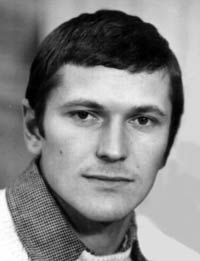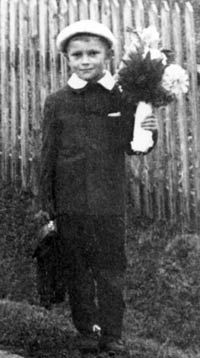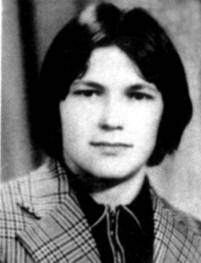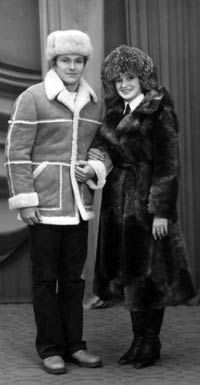(Born July 26, 1960, in Dolyna, Ivano-Frankivsk oblast).
Repressed for his principled stance as a member of a family of political prisoners.
From the family of OUN members Petro SICHKO and Stefania PETRASH, who were imprisoned in 1947 for their participation in the national liberation movement. After being released to a settlement near Magadan, they married in 1957 and returned to the village of Vytvytsia, Dolyna raion, with their son Vasyl. They built a house in the town of Dolyna, where Volodymyr and Oksana (born April 10, 1963) were born.
The parents did not hide their past from their children, telling them about their time in the underground and their imprisonment. Their home was visited by former political prisoners, members of the OUN and UPA, such as Volodymyr Horbovyi and Mykhailo LUTSYK, organizers of the Norylsk camp uprisings Vasyl and Lina Hachkevych, and human rights activists Vasyl STRILTSIV, Oksana MESHKO, Oles BERDNYK, Mykola RUDENKO, and others. The children witnessed numerous searches, surveillance, and persecution. As they grew older, they were entrusted with serious tasks, such as passing on information.
Volodymyr attended Dolyna School No. 1 from 1967 to 1977, graduating with only two “B” grades. In the spring of that year, his brother Vasyl was expelled from the journalism faculty of Kyiv State University, while Volodymyr was admitted to the mechanics and mathematics faculty of KSU, specializing in “mechanics.” He was a good student.
In October 1978, at the military department, Sichko was summoned for a conversation with a KGB major, who suggested that he inform on the activities and intentions of his father and brother, who had become members of the Ukrainian Helsinki Group that year. Volodymyr flatly refused. The KGB officer then proposed that he inform on UHG member V. STRILTSIV—his former high school English teacher. In return, he was promised a successful graduation from the university, a good job, and material benefits. Upon refusal, the officer demanded he inform on the mood among the student body. Failing to secure his consent, he called Sichko a traitor to the Motherland, gave him a day to think, repeated his demands, and declared: “Now we will decide when to expel you. Maybe tomorrow, maybe in a month, maybe in a year.” He also forbade him from disclosing this conversation.
Sichko’s father and brother were arrested on July 6, 1979, and sentenced on December 4 on charges of “disseminating slanderous fabrications that defame the Soviet state and social system” (Article 187-1 of the Criminal Code of the UkrSSR). On December 11, the family was granted a visit. As it was a day of classes at the military department, Volodymyr submitted an application to the head of the department and was excused. However, he received a failing grade for a test and was subsequently given failing grades in other subjects. By the dean’s order No. 192 of March 21, 1980, Sichko was expelled “for academic failure.” Outraged classmates sent a telegram to L. Brezhnev, but the post office forwarded it to the dean’s office. A Komsomol meeting was convened, at which the dean announced to the students that Sichko was expelled because his father and brother were nationalists and were in prison. Sichko then submitted an application to the Komsomol committee to leave the organization and surrendered his membership card.
Returning to Dolyna, he enrolled in a driver’s course. On September 21, 1980, he renounced his Soviet citizenship and demanded permission to emigrate to the United States to live and obtain an education. The Presidium of the Supreme Soviet of the USSR forwarded his application to the Supreme Soviet of the UkrSSR, which in turn sent it to the Ministry of Education, which replied that it did not consider applications for renunciation of citizenship.
On October 7, 1980, Sichko distributed an “Appeal to the Students of the World.”
Three months later, Sichko was drafted into the army. In front of witnesses, he added that he would not join an army that was waging a war of aggression in Afghanistan. The case was referred to the prosecutor’s office. On December 6, 1980, a criminal case was opened against Sichko under Part 1 of Article 72, “Evasion of regular conscription for active military service.” On January 9, 1981, Sichko was sentenced by the Dolyna District Court to 3 years of imprisonment in a general-regime camp. In his final statement, Sichko said, among other things:
“You demanded... that I renounce my own father’s views in writing... You hypocrites—why don’t you renounce your own parents for raising you to be so callous and indifferent to human suffering. I do not admit any guilt, and the reason I am not joining the army is your evil actions against me... I declare that I am not a slave and not a Soviet citizen, and you have no right to judge me, because according to the Final Act of the Helsinki Accords, every person has the right to choose their citizenship and the country in which they want to live.”
He served his sentence in general-regime colony YaYa-310/20 in Vilniansk, Zaporizhzhia oblast. He worked in a construction brigade. The camp was a “hungry” one. Many of his letters did not reach his mother; he was deprived of the right to receive parcels and packages, denied visits on the day of his mother’s arrival, and sometimes thrown into the punishment cell. Sichko had authority among the prisoners and even the respect of some of the administration because he behaved honorably, risking himself to protect ordinary people from the “thugs.”
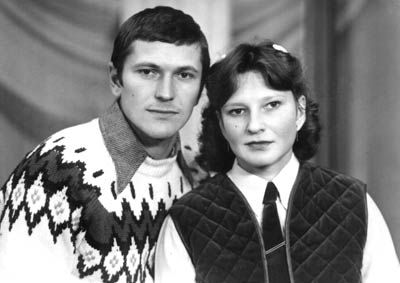
On KGB orders, the administration surrounded Sichko with “snitches” and gathered material to open a case under Andropov’s Article 183-3 of the Criminal Code of the UkrSSR, “Malicious disobedience to the requirements of the administration of a corrective labor institution.” However, Sichko knew how to neutralize the operational work against him.
After his release in December 1983, he prepared to enter the Institute of Physical Culture and passed his driver’s license exams. But in the spring of 1984, he was drafted into the army. After consulting with his parents, he decided to go.
He served in a construction battalion in Cherepovets, Vologda oblast, worked on construction sites, and later managed a canteen. He married in 1986. After demobilization, he worked as a driver in Siberia on a rotational basis for another two years. 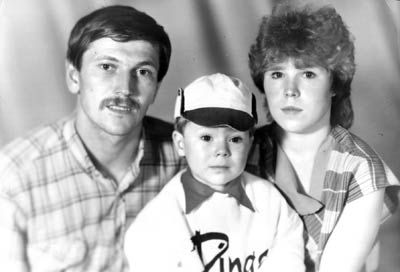
In December 1988, he moved to Kalush, and in the spring of 1992, to Dolyna. He was obstructed from finding employment and was not even allowed to play soccer for the local team.
He was a founding member of the Ukrainian Christian-Democratic Front (later the Ukrainian Christian-Democratic Party), created by his brother Vasyl in 1988. He took part in numerous rallies organized by his brother and father, for which their car was burned on August 18, 1989, his father’s birthday.
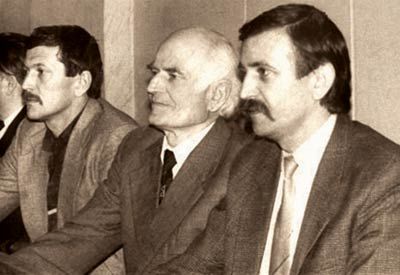
From April 2, 1996, to December 18, 2001, he worked in the United States (in New York and Chicago, installing vinyl windows). When his brother tragically died in Chicago on November 17, 1997, he paid to transport his body back to his homeland.
After returning to Ukraine, he bought a truck and is involved in international transport. He participated in his father’s election campaign and is a member of the Main Council of the UCDP.
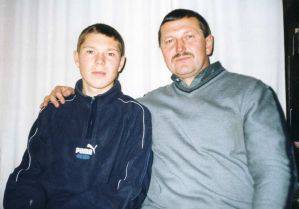
He lives in Dolyna. He is married to Valentyna; they have a son, Taras (b. 1986), and daughters Olga (b. 1989) and Valentyna (b. 2002).
Bibliography (short):
Herald of Repressions in Ukraine. Foreign Rep. of the UHG. Ed.-comp. N. Svitlychna. New York. 1980–1985. – 1981: 1, 2, 3, 5; 1982: 2-2, 6-12, 6-32, 10-22; 1984: 6-20, 10-21; 1985: 10-17.
A Family Torn Apart. Compiled by Dr. Nina Strokata. WCFU Committee for the Defense of Persecuted Persons, 1981. – 44 p.
The Ukrainian Helsinki Group. 1978—1982. Documents and Materials. Toronto-Baltimore: Smoloskyp, 1983.— pp. 691–705.
The Ukrainian Public Group to Promote the Implementation of the Helsinki Accords: Documents and Materials. In 4 volumes. Comp. Y. Zakharov, V. Ovsiyenko. KHPG. – Kharkiv: Folio, 2001. Vol. 4, pp. 172-175, 195-196.
The Three Uprisings of the Sichkos: In two volumes. Vol. 1. Memoirs of Stefania Petrash-Sichko. Documents / Kharkiv Human Rights Protection Group; Editor-compiler V. V. Ovsiyenko. Kharkiv: Folio, 2003. ─ 256 p.; Vol. 2: Memoirs. Interviews. Letters. – 240 p.
KHPG Archive: Interview with Volodymyr Sichko from November 14, 2002. https://museum.khpg.org/1121768715
Herald of Repressions in Ukraine. Foreign Rep. of the UHG. Ed.-comp. N. Svitlychna. New York. 1980–1985. – 1980:
International Biographical Dictionary of Dissidents of the Countries of Central and Eastern Europe and the Former USSR. Vol. 1. Ukraine. Part 2. – Kharkiv: Kharkiv Human Rights Protection Group; “Prava Lyudyny,” 2006. – pp. 708–711. https://museum.khpg.org/1120658779
The Resistance Movement in Ukraine: 1960 – 1990. An Encyclopedic Guide / Foreword by Osyp Zinkevych, Oles Obertas. – K.: Smoloskyp, 2010. – pp. 592–593; 2nd ed.: 2012, – pp. 674–675.
Volodymyr Kaplun, Vasyl Ovsiyenko. Kharkiv Human Rights Protection Group. December 20, 2002. Corrections by V. Sichko on January 31, 2003. Last read on July 23, 2016.
Bibliography (more complete):
(VRU, 1981: 1-4, 2-5, 3, 5; 1982: 2-2, 6-12, 6-32, 10-22; 1984: 6-20, 10-21; 1985: 10-17)
Herald of Repressions in Ukraine. 1981, Issue 1. 1─4. (On the case of Volodymyr Sichko).
Herald of Repressions in Ukraine. 1981, Issue 2. 2─5. (On the sentencing of Volodymyr Sichko).
V. Sichko sentenced. - newspaper “Svoboda,” Feb. 18, 1981 (USA).
Soviets sentence Volodymyr Sichko. // Newspaper The Ukrainian Weekly. Feb. 22, 1981 (USA).
Sichko sentenced to three years. // Newspaper “Ukrayinskyi Holos,” Feb. 25, 1981 (USA).
Volodymyr Sichko sentenced to three years. // Newspaper “Batkivshchyna,” February 1981 (USA).
Ukrainian Representation of the UHG. // Newspaper “Batkivshchyna,” February 1981 (USA).
Volodymyr Sichko sentenced. // Newspaper “Ukrayinski Visti,” March 1, 1981 (USA).
Review of the activities of the UHG. // Newspaper “Ukrayinske Slovo,” March 1, 1981.
Volodymyr Sichko, political prisoner. “Final statement at the trial 9/1-81” (Dolyna, Ivano-Frankivsk oblast). 9.1.81. // Samizdat Materials, Issue No. 9/81. March 6, 1981, AS No. 4225 (2 pages).
Stefania Petrash. Complaint to the Supreme Court of the USSR... regarding the trial of her son, political prisoner Volodymyr Sichko.., Dolyna, Ivano-Frankivsk oblast, March 11, 1981. // Samizdat Materials, Issue No. 9/81. March 6, 1981, AS No. 4228 (4 pages).
Volodymyr Sichko sentenced to three years. // Newspaper “Ukrayinske Slovo,” March 8, 1981 (USA).
The entire Sichko family - persecuted. // Newspaper “Svoboda,” March 24, 1981 (USA).
Volodymyr Sichko’s statement on renouncing USSR citizenship as of September 21, 1980. // Newspaper “Svoboda,” March 24, 1981 (USA).
Nina Strokata. New reports on the persecuted Sichko family. // Newspaper “Svoboda,” March 25, 1981 (USA).
Volodymyr Sichko’s appeal to the students of the world. // Newspaper “Svoboda,” March 25, 1981 (USA).
N. Strokata. More on the Sichko family. // Newspaper “Svoboda,” March 26, 1981 (USA).
N. Strokata. Mother Sichko on the trial of Volodymyr Sichko. // Newspaper “Svoboda,” March 27, 1981 (USA).
From Stefania Sichko’s complaint to the Supreme Court of the USSR and UkrSSR. // Newspaper “Svoboda,” March 27, 1981 (USA).
In defense of the arrested and persecuted in Ukraine! // Journal “Ekran,” 1981, No. 112-113.
Young Ukrainian Appeals to World's Students. // Journal Smoloskyp, 1981,Vol. 3, No. 11, p. 1, 6.
Political Prisoners in the USSR. // Journal Smoloskyp, 1981, Vol. 3, No. 11, p. 3, 4.
CCE.— New York: Khronika, 1981, Issue 57.— p. 61; Issue 60.— p. 62; Issue 61.— pp. 34-36.
A Family Torn Apart. Comp. By Dr. Nina Strokata, Human Rights Commission of Free Ukrainians, 1981.
Information bulletins of the Ukrainian Public Group to Promote the Implementation of the Helsinki Accords. Issues: No. 1, 1978; No. 2, 1978; unnumbered, March 1979; No. 1, 1980; No. 2, 1980. Committee for Helsinki Guarantees for Ukraine. Compiled by Osyp Zinkevych. Afterword by Nina Strokata. “Smoloskyp” V. Symonenko Ukrainian Publishing House. Toronto — Baltimore, 1981. p. 167.
Information bulletin No. 4, November 1978. Compiled by Nadia Svitlychna. Foreign Representation of the Ukrainian Helsinki Group. New York, 1981. pp. 9, 27.
Ukrainian Political Prisoners in the USSR. Address directory. As of December 1981. Compiled by Marta Harasovska. “Smoloskyp” V. Symonenko Ukrainian Publishing House. Toronto - Baltimore, 1981. p. 129.
CCE.— New York: Khronika, 1983, Issue 63.— p. 168.
Herald of Repressions in Ukraine. Foreign Representation of the Ukrainian Helsinki Group.— New York, 1982, 6-12, 6-32, 7/8-4; 1984, 6-20.
The Ukrainian Helsinki Group. 1978 — 1982. Documents and Materials. Compiled and edited by Osyp Zinkevych. “Smoloskyp” V. Symonenko Ukrainian Publishing House. Toronto — Baltimore. 1983. 998 p. .— pp. 691-705.
Herald of Repressions in Ukraine. Foreign Representation of the Ukrainian Helsinki Group.— New York, 1984, 6-20.
The Ukrainian Public Group to Promote the Implementation of the Helsinki Accords: Documents and Materials. In 4 volumes. Kharkiv Human Rights Protection Group. Compilers Y.Y. Zakharov, V.V. Ovsiyenko. Kharkiv: Folio, 2001. The Ukrainian Public Group to Promote the Implementation of the Helsinki Accords: Documents and Materials. In 4 volumes. Kharkiv Human Rights Protection Group. Kharkiv: Folio, 2001. Vol. 4, pp. 172-175, 195-196.
The Three Uprisings of the Sichkos. In 2 vols. Compiled by V. Ovsiyenko. KHPG Publishing, 2004.
Petro Sichko’s Archive (letters, documents, manuscripts, photographs).
Kharkiv Human Rights Protection Group Archive, including audio recordings of interviews with Petro Sichko on July 7, 1998, Feb. 4, 2000, and Volodymyr Sichko on Dec. 17, 2002.
Bibliography compiled by Vasyl Ovsiyenko on March 9, 2004. Kharkiv Human Rights Protection Group.
